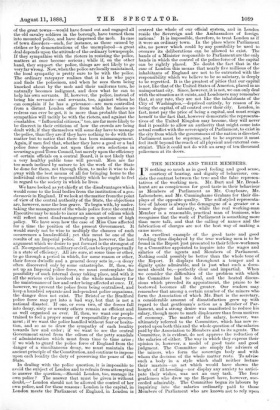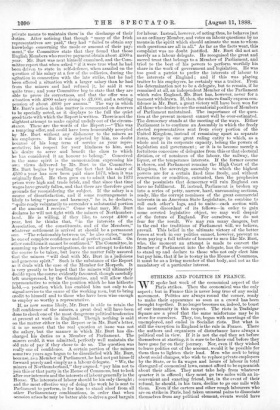THE MINERS AND THEIR MEMBERS.
TN nothing so much as in good feeling and good sense, courtesy of bearing, and dignity of behaviour, con- sists the contrast between the true and the false represen- tatives of the working men. Mr. Burt and Mr. Broad- hurst are as conspicuous for good taste in their behaviour as Members of Parliament as Mr. Conybeare, Mr. Labouchere, and Mr. Cunninghame Graham for their dis- plays of the opposite quality. The self-styled representa- tive of labour is always the demagogue of a greater or a lesser degree of intensity, while the real working-man Member is a reasonable, practical man of business, who recognises that the work of Parliament is something more than mere talk, and that the coiling of names and the fabrication of charges are not the best way of making a cause move.
An excellent example of the good taste and good breeding thus displayed by the true working men is to be found in the Report just presented to their fellow-workmen by a Committee appointed to inquire into the wages and salaries of the agents and Members of Parliament. Nothing could possibly be better than the whole tone of the Report. It displays throughout a temper and a. dignity quite admirable, and is just what such a docu- ment should be,—perfectly clear and impartial. When we consider the difficulties of the problem with which the Committee had to deal, and the heated discus- sions which preceded its appointment, the praise to be bestowed becomes all the greater. Our readers may remember that among a certain number of the miners who form the Association of which Mr. Burt is the secretary, a considerable amount of dissatisfaction grew up with regard to that gentleman's action as a Member of Par- liament, and a strong desire was manifested to reduce his salary, though more to mark displeasure than from motives of economy. The matter of the salary, however, was ultimately referred to the Committee, which has now re- ported upon both this and the whole question of the salaries paid by the Association to Members and to its agents. The Committee, it is evident, do not approve the reduction of the salaries of either. The way in which they express their opinion is, however, a model of good taste and good judgment. The Committee are simply the advisers of the miners, who form the sovereign body and with whom the decision of the whole matter rests. To advise such a body in a style which shall neither lecture their masters—an act which would have shown the height of ill-breeding—nor display any anxiety to antici- pate their wishes, was not an easy task. The four gentlemen who drew up the Report have, however, suc- ceeded admirably. The Committee began its labours by inquiring into the salaries ordinarily paid to those Members of Parliament who are known not to rely upon private means to maintain them' in the discharge of their duties. After noticing that though " many of the Irish representatives are paid," they had " failed to obtain any knowledge concerning the mode or amount of their pay- ment," the Committee state that they found that those English Members who receive payment obtain about £500 a year. Mr. Burt was next himself examined, and the Com- mittee report that when asked " if it were true what he had been driven to state in self-defence, when assailed on the question of his salary at a few of the collieries, during the agitation in connection with the late strike, that he had been offered a situation with a larger Wary than he had from the miners and had refused it, he said it was quite true ; and your Committee beg to state that they are able to prove its correctness, and that the offer was a altuation with £900 salary rising to £1,000, and a retiring pension of about £600 per annum." The way in which Mr. Burt's action in this matter is commented on deserves to be specially noted, as it displays to the full the quiet good taste with which the Report is written. There is not the slightest attempt to make capital unduly out of the circum- stance. These are the words of the Report :—" This was a tempting offer, and could have been honourably accepted by Mr. Burt without any dishonour to the miners as his employers. But it was rejected by him, no doubt because of his long term of service as your repre- sentative; his respect for your kindness to him, and his desire to serve and benefit the class to which he has considered it an honour to belong." Conceived in the same spirit is the memorandum expressing his own views delivered by Mr. Burt to the Committee. Mr. Burt begins by recalling the fact that his salary of X500 a year has now been paid since 1873, when it was originally fixed. He then goes on to admit that in 1873 prices were high and trade brisk, and that since that time wages have greatly fallen, and that there are therefore good grounds for reconsidering the subject. If the salary is a source of dissatisfaction, and if some rearrangement is likely to bring " peace and harmony," he is, he declares, " quite ready voluntarily to surrender a substantial portion of the amount I receive." Come what may, Mr. Burt declares he will not fight with the miners of Northumber- land. He is willing, if they like, to accept .2400 a year, but he thinks that, " in the interests of the Association, of the constituents, and of the Members," whatever settlement is arrived at should be a permanent one. " The relationship between us," he also states, " must be one of complete confidence and of perfect good-will. On ether conditions it cannot be continued." The Committee, in summing up their investigations, do not attempt to dictate the course to be taken, but leave the matter fully assured that the miners " will deal with Mr. Burt in a judicious and generous spirit." Such is the substance of the Report as it deals with the case of the Member for Morpeth. It is very greatly to be hoped that the miners will ultimately decide upon the course evidently favoured, though carefully left unexpressed, by the Committee, and will allow their representative to retain the position which he has hitherto held,—a position which has enabled him not only to do signal service to the cause of the working men, but to bring credit to himself and to those who have been wise enough to employ so worthy a representative.
If, as now seems likely, Mr. Burt is able to retain the full confidence of the miners, a great deal will have been done to check one of the most dangerous political tendencies at present at work in England. Though nothing is said on the matter either in the Report or in Mr. Burt's letter, it is no secret that the real question at issue was not the salary, but the manner in which Mr. Burt has dis- charged his duties as a Member of Parliament. The miners could, it was admitted, perfectly well maintain the old rate of pay if they chose to do so. The question was really one of confidence. A certain portion of the miners some two years ago began to be dissatisfied with Mr. Burt, because, as a Member of Parliament, he had not put himself forward purely and simply as a labour delegate. " We, the miners of Northumberland," they argued, " pay him not to join this or that party in the House of Commons, but to look after our interests and the interests of labour generally in the House. The interests of labour should be his only thought ; and the most effective way of doing the work he is sent to Parliament to perform, is for him to stand aloof from all other Parliamentary combinations, in order that when occasion arises he may be better able to drive a good bargain for labour. Instead, however, of acting thus, he behaves just as an ordinary Member, and votes on labour questions by no means in the spirit which should animate the man to whom such questions are all in all." As far as the facts went, this complaint was no doubt justified. Mr. Burt did not act merely as a labour delegate. He recognised the great and sacred trust that belongs to a Member of Parliament, and tried to the best of his powers to perform worthily his share in the work of government and legislation. He was too good a patriot to prefer the interests of labour to the interests of England ; and if this was playing traitor to his employers, he certainly was a traitor. From his determination not to be a delegate, but to remain, if he remained at all, an independent Member of the Parliament which rules England, Mr. Burt has, however, never for a moment withdrawn. If, then, the miners finally express con- fidence in Mr. Burt, a great victory will have been won for all those who desire to see the senatorial position of Members of Parliament maintained. The importance of the ques- tion at the present moment cannot well be over-estimated. The democracy stands at the meeting of the ways. Either Parliament is to continue an Assembly in which the freely elected representatives sent from every portion of the United Kingdom, instead of remaining apart as separate items, merge in one • great ruling entity to which, as a whole and in its corporate capacity, belong the powers of legislation and government ; or it is to become merely a fortuitous concourse of delegates from this or that electoral division, or of nominees of the labour, the railway, the liquor, or the temperance interests. If the former course is chosen, and Parliament remains the High Court of the Kingdom, the sovereign assembly to which the highest powers are for a certain fixed time freely, and without reservation or condition, entrusted, then the prophecies of the pessimists that democracy will ruin England can have no fulfilment. If, instead, Parliament is broken up into a series of petty, narrow, hard, unreasoning sections, ready, like the corrupt nominees of the great commercial interests in an American State Legislature, to combine to roll each other's logs, and to unite—each section with the most discordant of its fellows—in order to gain some coveted legislative object, we may well despair of the future of England. For ourselves, we do not fear for the result. We may run many dangers, but in the end the traditions of Parliament will, we believe, prevail. This belief in the ultimate victory of the better forces at work in our politics cannot, however, prevent us from paying a full tribute of honour to men like Mr. Burt, who, the moment an attempt is made to convert the Member of Parliament into the delegate, has the courage to stand up and declare to those who not only elect him but pay him, that if he is to stay in the House of Commons, it must be as a living member of that body, and not as the mandatory of a particular interest.



































 Previous page
Previous page